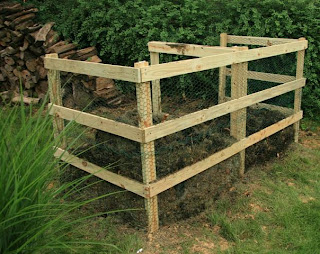 |
| A simple composter! Not our picture. |
But we know it comes from a place of discomfort, of knowing that people in our family tree died for lack of that 1/4 of a mashed potato serving you can't stuff in. And it also seems to arrive from a place of insecurity that their will be enough tomorrow. But there has to be a way to honor this fear by investing in future prosperity.
I would like to introduce a new perspective of our unedibles- a word I believe I made up and define as everything from onion skins to that last scrap of sauerkraut you can't bear to touch. A way to honor the potato famine and the depression without force feeding ourselves. A way to save the planet, keep our next harvest great, and ensure our families (and the earth's) health.
In our home, our garbage rarely needs to be taken out. It doesn't fill often, and it doesn't smell. Why you ask? Well, allow me to tell you! Food-and all the organic waste associated with it- never touch our garbage can. We handle scraps, peels, left overs, and others in several ways. From simple to complicated.
- Lunch. Thankfully, Mark loves left overs for lunch. I am not so big of a fan. Nothing tastes quite right the second day.
- Dog food. I know, I know, "human food is bad for dogs...." To be honest, if you look though the list of common dog allergens, it is easy to avoid those items when giving your dog a little human food topping on top of his or her kibble. My grandmother and my aunts have always done this for their dogs without ever a problem. Zoe's coat has never looked better since we began topping it with a little oil or grease from cooking. And we noticed her shedding decrease and her nail growth increase when we started making sure she was getting a little bit of real food every day. For a while, we made her food, but this became cumbersome and we worried when she developed hot spots that we were not giving her something she needed, switching back to kibble made us sad that she was eating what seemed like such a fake food product. The providing of scraps seems like an affordable middle ground that gets real food in Zoe, while providing nutrition she needs.
- Chicken feed. Admittedly, one needs to own chickens in order for this to work, but I'll tell you what- those little geeks LOVE scraps. And they especially love farm share left overs I didn't manage to get to (or swiss chard, which I willingly tun over to them fresh). I have never seen them so happy as when they were attacking a mushy old summer squash. And the more nutrients they eat, the more make it into my eggs. Also, their poop fertilizes my lawn so well! .
- Broth. We save and freeze all of our food scraps that could potentially be used in broth. We keep a half gallon jar in our freezer and fill it with brocolli stems, onion bottoms, leek tops, and potato skins. Every now and then, we'll roast a chicken (yes, we eat meat now, a post on that coming) and toss the bones in with the frozen veggie scraps to make a delightful, seasonal broth. Then, bones come out and veggies go into the compost. Goodbye $4 broth pints. Hello nutritious, fresh tasting soups!
- Compost. An obvious answer to food waste, compost has been used forever as a way to provide nutrients for the soil. We have been amazed watching our open compost fill and deflate during the winter. Well turned, it does not attract bugs or rodents, and we have become very aware of how quickly food will biodegrade if allowed access to oxygen, how much one family can have in scraps, and how great for a garden compost really is. Vermiculture (allowing worms to eat your scraps in buckets, essentially) is an easy alternative for people with no outdoor space to compost
No comments:
Post a Comment